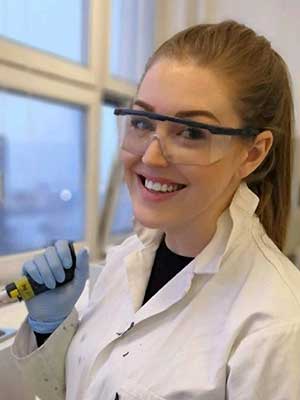Kate Paterson
BSc (Hons) Biomedical Science
Kate studied this course to gain the day-to-day skills needed to work in a lab, and has now secured a position as specialist biomedical scientist in the NHS.
This course equipped me with many valuable skills which allowed me to secure a job within the NHS and quickly adapt to my new role.

Job title
Specialist biomedical scientist at North Tees and Hartlepool NHS Foundation Trust
Why Teesside and why your chosen subject?
I had always been interested in patient care, and was a dental nurse in my younger years. I liked the idea of being able to contribute and have a feeling of accomplishment at the end of each working day.
Best part about studying at Teesside?
I enjoyed the facilities, particularly the labs and library. I appreciated the external teaching on the course, including the NHS, which gave me the opportunity to work alongside colleagues at North Tees Hospital. This course also offers excellent value for money – I’m now working in the NHS so I’m able to appreciate how much reagents, equipment and time can cost.
How did uni help prepare you for your career?
The skills I learned in practical sessions equipped me with the day-to-day skills I needed for my role within the lab. This includes spreading blood films, identifying abnormal cells under the microscope, pipetting techniques, and analysing and identifying blood groups and antibodies.
Tell us about your career since graduating
In my third year of uni, I volunteered in specimen reception in clinical pathology at North Tees Hospital. After five weeks, I joined NHS Professionals to get paid for my shifts. I later secured a position as a biomedical scientist. I graduated with a first-class honours degree and started my new role as trainee. Alongside training in the lab, I started my Institute of Biomedical Science registration portfolio, to register with the Health and Care Professions Council as a practicing biomedical scientist. From then, I started training for my Specialist Diploma in Haematology and Transfusion Science. A post for a specialist biomedical scientist was advertised and I was successful. I completed my specialist portfolio and have attended Teesside alongside colleagues to deliver practical sessions to current students. It’s nice to come back and offer my knowledge to early scientists. I also attended the induction week and presented short sessions on my journey so far, which I really enjoyed.
Tell us about your current role
My main duties include analysing samples according to the departmental standard operating procedures, phoning urgent results to the relevant requesting clinician, liaising with haematology consultants and other service users, relaying tests results, analysing blood film morphology under the microscope to identify abnormal cells and report findings, knowledge of the disease process and the clinical relevance, performing internal and external quality controls, performing tests within blood transfusion, and providing skills drill training to newly qualified doctors within the trust.
Would you recommend this course at Teesside?
I absolutely would. There was a wide variety of lectures and hands-on practical sessions from internal/external teachers and NHS/private establishments. I particularly enjoyed the third year modules which were mostly clinical-based. I gained many skills in the practicals, which I now use day-to-day in my current role.
